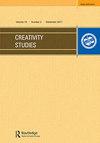创业学习提高自我效能感、创业意向和学生成就的创新模式
Q1 Social Sciences
引用次数: 0
摘要
本研究运用Albert Bandura的社会认知理论和自我效能感,旨在构建一个有效、实用和有效的创业学习模型,以实现具有高水平知识和创业精神的人力资源。自我效能感是一个人在拥有知识、经验和技能的基础上实施各种活动的信念或信心。这项研究是在印尼棉兰州立大学和一些小公司进行的。人口是2016年在棉兰州立大学学习创业的所有班级,以及印度尼西亚北苏门答腊岛棉兰的所有小企业。采用有目的随机抽样的方法,选取经济学院的4个班级和4家企业。所使用的开发研究方法:1)初步调查,2)设计,3)实现(构建),4)测试、评估、修订。样本用于学习模型的应用和实验,公司用于学生的实习/观察。采用有效性、实用性和有效性指标评价模型的质量。由教学模式专家进行了效度检验。通过学生t检验比较1)自我效能感、2)创业意向和3)学习成就的改善来衡量有效性。研究结果证明,应用基于商业的创业学习模式可以显著提高学生的创业意愿,但不能提高学生的学业成绩。本文章由计算机程序翻译,如有差异,请以英文原文为准。
A CREATIVE MODEL OF ENTREPRENEURSHIP LEARNING TO IMPROVE SELF-EFFICACY, ENTREPRENEURIAL INTENTION, AND STUDENT ACHIEVEMENT
This study aims to produce a valid, practical and effective model of entrepreneurial learning to achieve human resources with high level of knowledge and entrepreneurial spirit, and it uses Albert Bandura’s social cognitive theory and self-efficacy. Self-efficacy is someone’s belief or confidence to implement a variety of activities based on the knowledge, experience and skills possessed. The study was conducted at State University of Medan, Indonesia and some small companies. The population was the whole 2016 classes studying entrepreneurship at State University of Medan and all the small businesses in Medan, North Sumatra, Indonesia. Four classes in the Faculty of Economics and four companies were selected by purposive random sampling. The development research method used: 1) initial investigation, 2) design, 3) realization (construction), and 4) testing, evaluation, revision. The sample was used for the application and experimentation of the learning model, and the companies were for students’ internship/observation. The quality of the models was assessed using the indicators of validity, practicality, and effectiveness. The validity was tested by experts of instructional model. The effectiveness was measured by comparing 1) self-efficacy, 2) entrepreneurial intention, and 3) the improvement of learning achievement by Student’s t-test. The research findings proved that the application of business-based entrepreneurial learning model can positively and significantly improve students’ entrepreneurial intention, but it cannot improve the academic achievement of students.
求助全文
通过发布文献求助,成功后即可免费获取论文全文。
去求助
来源期刊

Creativity Studies
Social Sciences-Cultural Studies
CiteScore
3.20
自引率
0.00%
发文量
38
审稿时长
15 weeks
期刊介绍:
Creativity Studies accepts original research articles with a focus on communication within the creative society. The journal welcomes contributions from scholars from diverse disciplines such as philosophy, sociology, history, political, communication and information sciences. Creativity Studies also publishes survey papers and descriptions of academic events in this area. The journal issues will be organized around different issues on creativity.
 求助内容:
求助内容: 应助结果提醒方式:
应助结果提醒方式:


